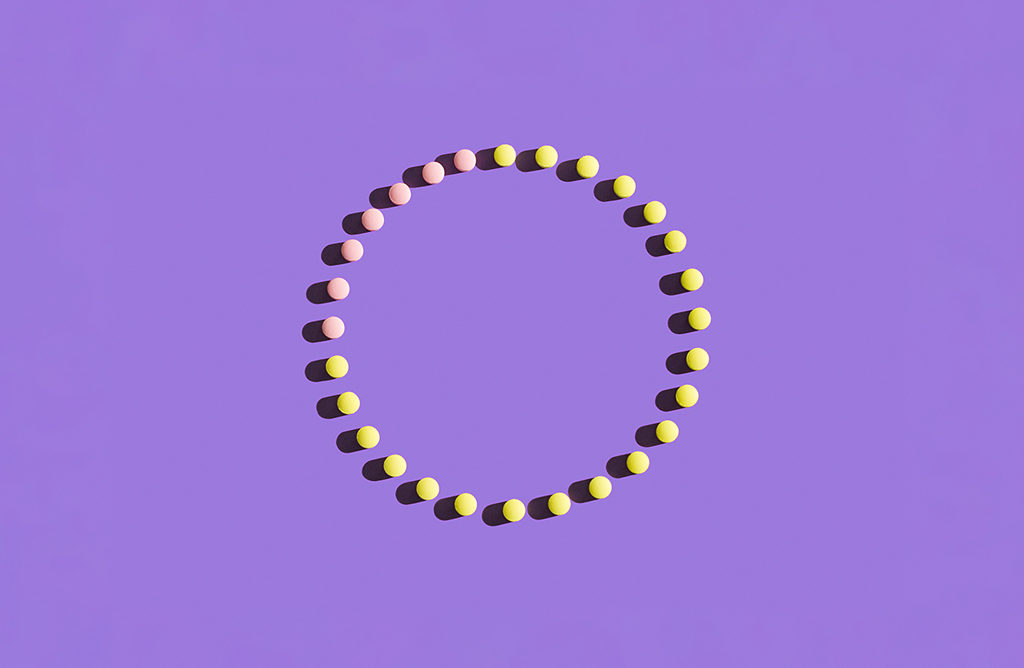Does the Birth Control Pill Cause Infertility?
Here at Ava, we take data—especially fertility and pregnancy data—very seriously. Our team is led by premier data scientists, obstetricians, gynecologists, and reproductive endocrinologists, many of whom hold PhDs and decades of experience in their respective fields. So, when you read content on AvaWorld, you can trust that it’s backed by science and has been thoroughly researched and vetted by our experts.

Essential Takeaways
- There is no evidence that birth control negatively affects your fertility long-term.
- Most women resume a normal menstrual cycle within two months after stopping hormonal birth control.
- The birth control pill can mask signs of aging or other reproductive disorders that can have an affect on your ability to conceive.
While most women appreciate the effectiveness and ease of using hormonal birth control when they are not ready for pregnancy, many start to wonder if their years on the pill may have affected their fertility once they are ready for a family. But the good news is that there is no evidence that taking the pill, no matter how long, will impact your fertility. Read on for more information about the birth control pill, your fertility, and what you need to know when you’re ready to conceive.
Does birth control affect fertility?
Nope! Contrary to what many people believe, the hormonal birth control pill does not hurt your future fertility, nor does it cause infertility. However, being on the birth control pill can mask other reproductive disorders that can affect your fertility.
For example, a woman who has Polycystic Ovary Syndrome (PCOS) may have irregular menstrual cycles, acne, or hair growth on her face. The birth control pill contains artificial hormones that cause regular bleeding and even lessen the symptoms of PCOS. A woman who didn’t realize that she had PCOS may have difficulty conceiving when she stops taking the birth control pill because of her undiagnosed PCOS, not because of the pill.
This is true of other conditions as well; endometriosis, hypothalamic amenorrhea and other ovulatory disorders may not show any symptoms when a woman is taking birth control. This can lead to a delay in being diagnosed until after they stop taking it and are ready to conceive.
Can being on the pill for years affect fertility?
This is another no! Being on the pill for years (and years and years!) does not impact your fertility. However, just as hormonal birth control can mask the symptoms of certain conditions that can affect your fertility, it can also mask signs of normal aging.
A woman who is taking the pill for many years is that much older when she stops. If she is in her 30’s or 40’s, she may begin experiencing the changes associated with perimenopause or even premature menopause. However, the hormones in birth control can mask these signs, making her unaware that her fertility may be declining. She may not even realize until after she stops taking the pill and is having difficulty tracking her cycles or getting pregnant.
How soon after stopping the pill can I get pregnant?
There’s no medical reason why you can’t get pregnant right away! However, some women may notice that they don’t ovulate the first month or two after stopping the pill. One 2009 study that looked at almost 60,000 hormonal birth control users found that around 20% of women became pregnant in the first month after stopping birth control use, and 80% within the first year. These numbers are similar to women who are not taking hormonal birth control.
Another study, however, found that there can be a short period of time, of up to around nine months, where a woman can experience disruptions to her menstrual cycle. They also found that around 57.9% of women ovulated in the very first month after stopping the pill.
What happens to your body when you stop birth control?
It is not uncommon to experience a few side effects after stopping hormonal birth control. Some women gain or lose weight. Others, especially those who stop in the middle of their cycle, may start bleeding or spotting before their next period.
Another common side effect is post-pill amenorrhea, which is just the technical term for not getting a period after stopping the pill. This can be caused by a medical issue completely unrelated to your birth control, or from the hormones regulating after stopping.
Other side effects can include:
- Acne
- Irregular periods
- Changes in mood
- Periods that are heavier than usual
- Menstrual cramps that are stronger than usual
These side effects are usually short-lived and resolve on their own within a couple months. Make sure to talk to your doctor or health care provider about any questions or concerns.
Can birth control increase your chances of becoming pregnant?
When taken as prescribed, the birth control is very effective at preventing pregnancy. However, when used for a month or two directly before infertility treatment, like in vitro fertilization (IVF), using birth control may actually increase your chances of pregnancy. A 2000 study found that women who used the pill prior to their IVF medication had a higher pregnancy rate than those who didn’t.
Are you most fertile when you stop the pill?
Not really. Some women are able to conceive right away; a woman who stops the pill at the end of her pack may ovulate during her very next cycle, usually in about two weeks. However, other women do find that it takes a few months before their menstrual cycle becomes more regular, returning her fertility back to normal.
How long does birth control stay in your system after you stop taking it?
The good news is that there is no need to “detox” or give your body a break after stopping hormonal birth control. The hormones in the pill are out of your body fairly quickly and your normal cycle should resume within a few months, if not right away.
Some healthcare providers recommend using a barrier form of birth control (like a condom) or waiting a few months before trying to conceive. This isn’t because there is a medical reason for doing so, but because having a regular period can make it easier to plan for and track a pregnancy.
What happens if I don’t get my period back right away?
You should get your period back within one to two months after stopping your birth control pill. This is true whether you’ve been on the pill for two months or ten years. You should give your gynecologist or primary care doc a call if your period doesn’t come back within two months.
View sources
Pregnancy Rates After Oral Contraceptive Use
Cycle characteristics after discontinuation of oral contraceptives










